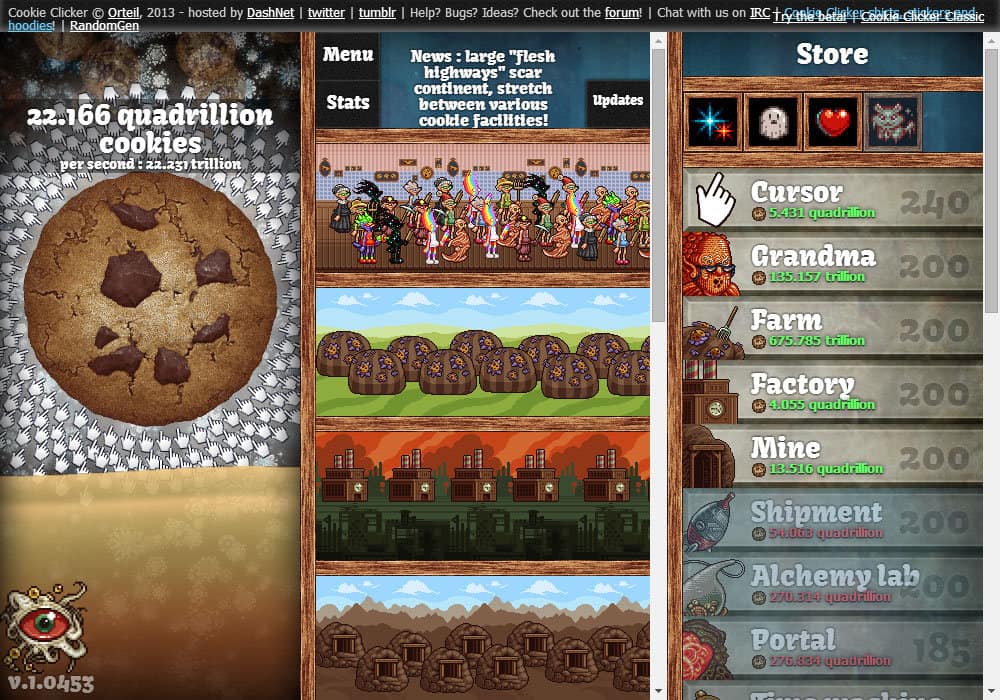Have you ever stared at a screen, clicking furiously at a virtual cookie, knowing you could be doing something more productive? If so, you’re not alone. Millions of players worldwide have succumbed to the hypnotic allure of Cookie Clicker, a deceptively simple game that taps into a fundamental human desire: the pursuit of infinite accumulation. But what lies beneath the surface of endless clicking? Could it be that Cookie Clicker is more than just mindless entertainment? Could it be…totally science?

Image: gail-brekke.github.io
Cookie Clicker, at its core, presents a microcosm of economic principles, the fascinating interplay of resources, and the relentless march of automation. From the simple act of clicking to building intricate empires of cookie production, the game inadvertently introduces players to concepts like exponential growth, compound interest, and the ever-present trade-off between immediate gratification and long-term gains. It’s a crash course in economics, disguised as a whimsical baking spree.
The Exponential Power of Cookies
The Power of Compound Growth
The very essence of Cookie Clicker lies in the concept of exponential growth. Every click earns you cookies, which can then be invested in upgrades, buildings, and other multipliers. These multipliers, in turn, amplify your cookie production at an astonishing rate, creating a snowball effect that quickly spirals out of control. Each new upgrade feeds into the next, driving your cookie earnings higher and higher. This mirrors the real-world power of compound interest, where returns on investments grow not only on the initial principal but also on the accumulated interest, leading to a dramatic acceleration of wealth.
The Importance of Automation
As your cookie empire expands, the sheer volume of clicks becomes increasingly unsustainable. This is where automation comes in. Cookie Clicker introduces a plethora of “buildings” – cookie-producing factories, farms, and even banks. Each building represents an investment in automated production, allowing you to generate cookies even when you’re not clicking. This exemplifies the fundamental shift from manual labor to automated processes that drive economic growth in the real world. We can see this in everything from modern factories to online businesses, where technology is used to maximize output and efficiency.

Image: jag-en-ligne.com
Beyond the Click: The Science of Cookie Clicker
Gamifying Economics
While Cookie Clicker might seem like just a fun distraction, its simplicity hides a powerful learning experience. It introduces basic concepts of economics like resource allocation, production, consumption, and the intricate relationship between these factors. Players intuitively grasp these principles as they navigate the game, deciding how best to allocate their resources, maximizing their cookie production, and ultimately achieving milestones that would have seemed impossible at the start. This gamification of economics makes these concepts more engaging and relatable, transforming abstract theories into tangible experiences.
Understanding the Psychology of Addiction
The allure of Cookie Clicker extends beyond its economic model. The game’s addictive nature is rooted in psychology. The simple, repetitive action of clicking, coupled with the constant feedback of increasing cookie production, provides a sense of accomplishment and satisfaction. This triggers the brain’s reward system, releasing dopamine, a neurotransmitter associated with pleasure and motivation. This positive reinforcement loop keeps players engaged, striving for the next upgrade, the next milestone, the next feeling of satisfaction. Cookie Clicker, in this way, becomes a testament to the power of addictive feedback loops in game design and how they can hold us captive to even the most seemingly trivial activity.
The Enduring Appeal of Cookie Clicker
Cookie Clicker, in its unassuming simplicity, offers a fascinating glimpse into the world of economics, psychology, and the nature of addiction. It’s a thought-provoking experience that can leave you contemplating the power of exponential growth, the importance of automation, and the addictive nature of simple, yet rewarding tasks. But perhaps its most enduring appeal lies in its accessibility. It’s a game that anyone can play, regardless of their background or knowledge. In a world increasingly driven by complex technologies and intricate systems, Cookie Clicker provides a refreshing reminder of the power of simple, yet engaging experiences that can teach us valuable lessons about the world around us.
Cookie Clicker Totally Science
Conclusion
Cookie Clicker is far from just a mindless time-waster. It’s a captivating exploration of economic principles and psychological factors, all wrapped up in an amusingly addictive experience. It pushes you to think about resource management, understand exponential growth, and appreciate the power of automation. It’s a journey that starts with a simple click and opens the door to a world of unexpected learning and insights. So, the next time you find yourself clicking away, remember that Cookie Clicker, while seemingly trivial, is actually totally science.






